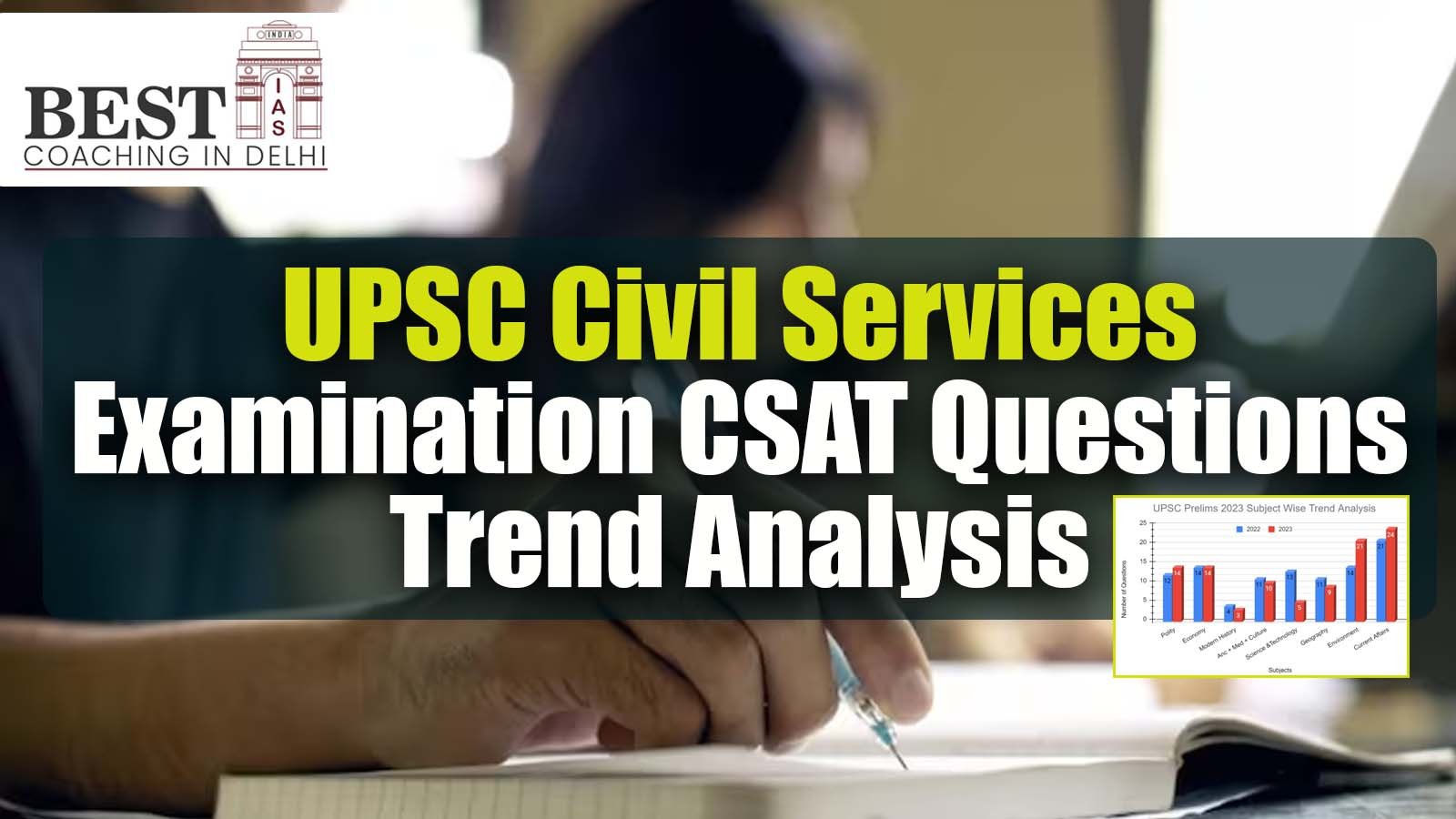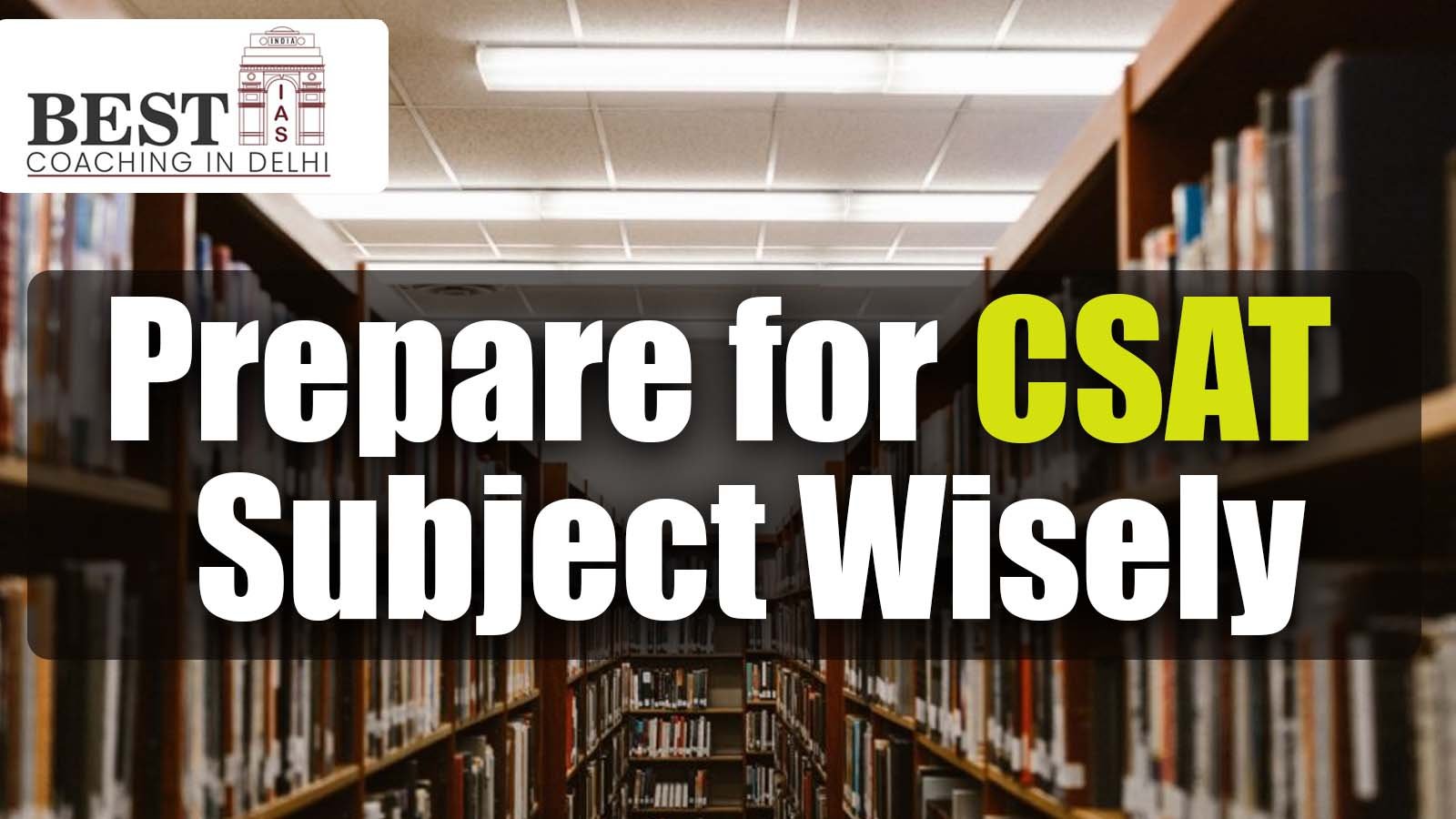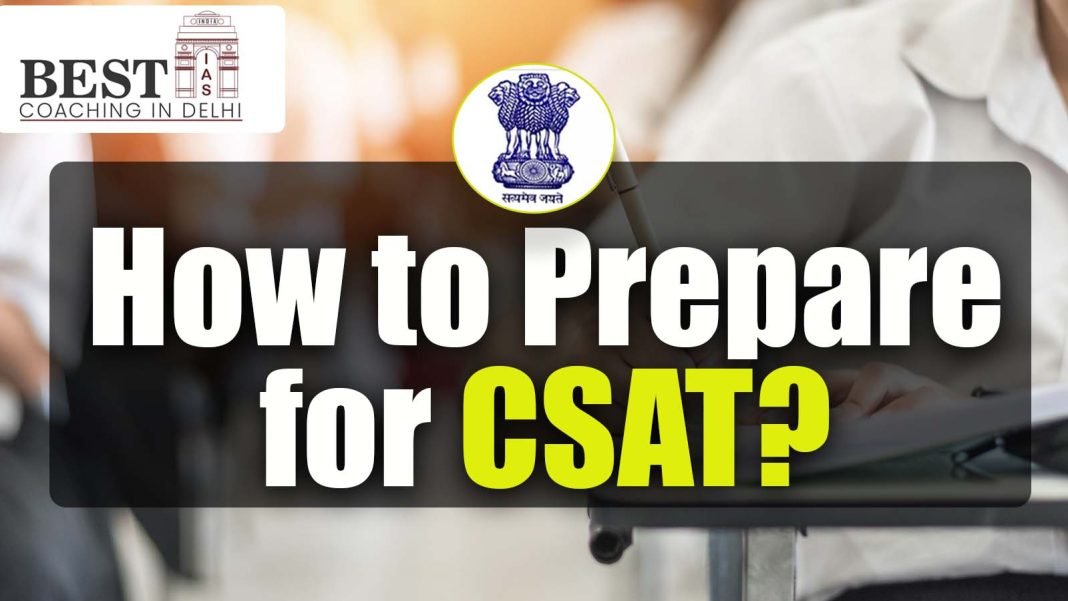Delhi is referred to as the UPSC Coaching Hub. Various institutes provide the best way to prepare for CSAT. However, there are some valuable points that we need to keep in mind while preparing for the CSAT.
The UPSC (Union Public Service Commission) Civil Services Examination includes the CSAT, or Civil Services Aptitude Test. Every year, the UPSC administers the fiercely competitive Civil Services Examination to select candidates for a range of civil service jobs in the Indian government, such as those in the Indian Foreign Service (IFS), Indian Administrative Service (IAS), and Indian Police Service (IPS).
The Civil Services Examination consists of three stages:

Preliminary Examination (Prelims):
The UPSC CSE begins with a preliminary exam. Its function is to shortlist candidates for the next round of examinations and act as a screening test.
-
General Studies Paper 1 (GS Paper 1)
What is the syllabus for GS Paper 1?
The basic purpose of this GS 1 is to evaluate the candidate’s knowledge and comprehensiveness of a broad range of topics. Subjects including History, Geography, Politics, Economy, Environment, Science and Technology, International relations, and Current Affairs are covered in the syllabus of GS Paper 1.
How many questions are in GS Paper 1?
The first GS paper consists of one hundred questions.
What is the total number of marks in GS Paper 1?
The paper is worth 200 marks.
What is the marking structure for GS Paper 1?
There are two marks for each question, and bad responses are deducted. Three-quarters of the marks are deducted for each question that is answered incorrectly.
How much time is allotted to the GS Paper 1 attempt?
The duration of GS Paper I is 120 minutes.
In GS Paper 1, what kinds of questions are there?
There are multiple-choice questions and objective-type questions in GS Paper 1.
-
General Studies Paper 2 (CSAT)
It is a component of the UPSC Prelims or the preliminary Civil Services Exam. It is also known as UPSC GS Paper-II by the Union Public Service Examination (UPSC).
What is the curriculum for the CSAT exam?
The purpose of the CSAT, also called GS Paper 2, Additionally, the purpose of CSAT is to evaluate an applicant’s aptitude, logical reasoning, analytical capacity, ability to make decisions, and paragraph reading skills. Math from 6th to 10th is essential.
What is the number of questions on the CSAT?
The Second GS Paper consists of 80 questions (CSAT).
How many marks are there in the CSAT?
The paper has 200 marks.
What is the CSAT scoring system?
The CSAT has a penalty for providing an incorrect response, just like in GS Paper 1, and each question is worth two marks.
How long does the CSAT require to be completed?
The GS Paper 2 (CSAT) has a 120-minute duration.
What kind of questions are asked on the CSAT?
Furthermore, the CSAT comprises multiple-choice (objective) questions.
When was CSAT added to the UPSC Civil Services Examination?
CSAT stands for Civil Services Aptitude Test in its entirety. Moreover, to assess IAS candidate’s aptitude, analytical prowess, and capacity for reasoning, it was added to the UPSC Civil Services Examination (Preliminary) in 2011.
How to Prepare for the CSAT (UPSC)?
If you can nail General Studies Paper 1 of the UPSC Prelims and surpass the threshold score, your application will be denied if you do not pass the CSAT paper. However, this demonstrates the significance of CSAT. Thus, be sure to adhere to a strong UPSC.
Plutus IAS has well-qualified and experienced faculties. Mr. Rakesh Nath is a well-known faculty member at Plutus IAS. He received his engineering degree from IIT Delhi, one of the best universities in India. Acquire strategic insights and test-winning skills by learning about the CSAT in the UPSC CSE exam. From 2020 to 2022, Mr. Rakesh Nath sat for the UPSC mains exam!
Mr. Rakesh Nath is therefore a skilled and knowledgeable tutor who can help you succeed on the CSAT portion of the UPSC exam. Mr. Rakesh Nath has shown a high level of proficiency in writing responses and a thorough understanding of the General Studies and Mathematics Optional subjects. Demonstrates a cheerful and upbeat attitude toward helping candidates succeed in the coveted UPSC Civil Services Examination.
UPSC Civil Services Examination CSAT Questions Trend Analysis
 These are the question weightage for UPSC Prelims GS Paper II (CSAT)
These are the question weightage for UPSC Prelims GS Paper II (CSAT)
| Exam
Year |
Reading
Comprehension |
Logical and Analytical Reasoning | Data
Interpretation |
Decision-making and Problem-Solving | Math and Basic Numeracy |
| 2011 | 39 | 17 | 5 | 8 | 11 |
| 2012 | 40 | 28 | 0 | 9 | 3 |
| 2013 | 33 | 21 | 9 | 6 | 11 |
| 2014 | 33 | 23 | 6 | 0 | 20 |
| 2015 | 30 | 18 | 2 | 0 | 30 |
| 2016 | 28 | 21 | 0 | 0 | 31 |
| 2017 | 30 | 22 | 0 | 0 | 28 |
| 2018 | 26 | 22 | 14 | 0 | 18 |
| 2019 | 30 | 18 | 0 | 0 | 32 |
| 2020 | 26 | 12 | 0 | 0 | 42 |
| 2021 | 27 | 15 | 1 | 2 | 35 |
| 2022 | 27 | 22 | 0 | 0 | 31 |
| 2023 | 27 | 14 | 0 | 0 | 39 |
When you prepare for CSAT that will enable you to pass the test with ease. Below are the methods to help you prepare for the CSAT UPSC 2023.
Before beginning your UPSC CSAT preparation, assess yourself
- There are various methods by which you can prepare yourself. The best way to check your preparation is to attempt the Previous Year Question (PYQ). This is the most efficient way to check your ability to succeed in the exam.
- Additionally, if you can score good marks in the previous year’s question, it will boost your confidence.
- However, if you are not able to score well in PYQ, try to solve it frequently. Don’t get disheartened by the low grade because being consistent in your practice is decisive.
Practice your UPSC CSAT paper with the Best reference books available
- There are tons of publications that you can use while preparing for CSAT.
- Additionally, the books are efficient and useful for learning about any topic.
- As a result, in the book, every chapter is explained very well, so the candidate can use it during preparation.
Holding Mock tests regularly
- Appearing in mock tests to determine one’s strong and weak areas would be beneficial when preparing for the UPSC CSAT.
- Additionally, periodic mock exam shortens the time required to answer a CSAT question and simulates an exam atmosphere.
Prepare for CSAT Subject Wisely

Comprehension, interpersonal skills, communication skills, logical reasoning and analytical ability, decision-making and problem-solving, general mental ability, and basic numeracy are among the topics included in the UPSC CSAT syllabus. Let’s examine how to focus on each of these areas below to get ready for the CSAT for the UPSC.
Basic Numeracy
Although the curriculum states that the questions should be at the 10th-grade level, answering the questions on the test will require a deeper and more thorough comprehension of the material.
- Introductions to Numbers
- Number Systems
- Fractions and Decimals
- Exponents and Powers
- Square Roots and Cube Roots
- Ratio and Proportion
- Percentage
- Algebraic Expressions
- Linear Equations
- Quadratic Equations
- Arithmetic and Geometric Progressions
- Basic Geometry
- Mensuration
- Data Handling
- Probability
Data Interpretation
Like fundamental numeracy, data interpretation is a component of the exam questions. The following lists the exam’s subtopics:
- Types of Data
- Tabular Data
- Vein Diagram
- Bar Graphs and Histograms
- Pie Charts
- Line Graphs
- Data Sufficiency
- Frequency of Distributions
- Measures of Central Tendency
- Measures of Dispersion
- Probability and Statistics
- Case Study Analysis
- Data Presentation
Logical Reasoning
Practicing logical thinking questions from last year’s question papers is the best approach to preparing for the CSAT exam.
- Introduction to Logical Reasoning
- Statement and Argument Analysis
- Statement and Assumption Analysis
- Statement and Conclusion Analysis
- Syllogism
- Coding-Decoding
- Blood Relations
- Seating Arrangements
- Puzzles
- Direction Sense
- Critical Reasoning
- Analogies
- Number Series
- Letter and Symbol Series
- Logical Deduction
- Logical Connectives
- Data Sufficiency
- Cause and Effect
- Decision-Making Problems
- Analytical Puzzles
General Mental Ability
- Basic numeracy and data interpretation, which cover subjects like numbers, relations between numbers, orders of magnitude, graphs, charts, data sufficiency, tables, etc., are covered in the syllabus for this section. The questions have a matriculation degree of difficulty.
- Learn the fundamentals of mathematics first, including time, distance, speed, and work.
- Try to solve the previous year’s question as much as you can.
- Finally, cut down on the amount of time it takes to answer questions by doing more practice exams.
Conclusion
The main result of CSAT classes for UPSC will be reflected in your further results. If you implement the points mentioned above, then you will surely get the results. If you want precise results, then you can enroll in any institute. CSAT preparation for UPSC Civil Services Examination needs a lot of preparation and guidance from well-qualified and experienced faculty. The UPSC is currently altering the questions that are asked during the test. But you can do well on this paper if you study and comprehend the syllabus. This article contains all the necessary points that are crucial in CSAT preparation. We have also covered the crucial parameters of How to Choose an IAS Coaching? you can check that also.



